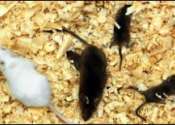Salk researchers chart epigenomics of stem cells that mimic early human development
Scientists have long known that control mechanisms known collectively as "epigenetics" play a critical role in human development, but they did not know precisely how alterations in this extra layer of biochemical instructions ...



